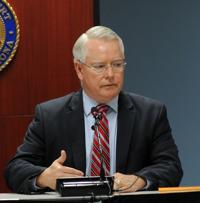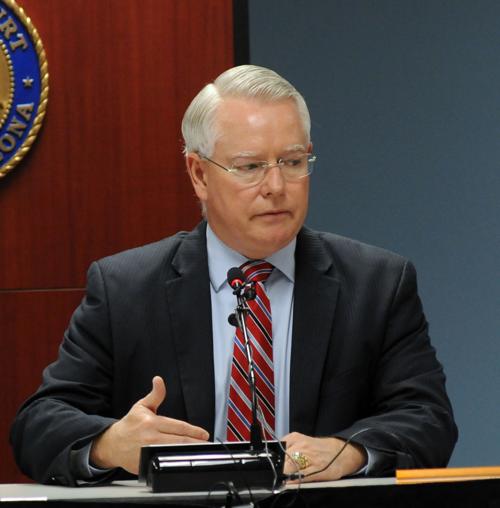PHOENIX — A revamped Commission on Appellate Court Appointments agreed late Friday to include a nomination for Republican Maricopa County Attorney Bill Montgomery for the soon-to-be-open seat on the Arizona Supreme Court.
The decision to include Montgomery among the seven nominees sent to Gov. Doug Ducey came five months after the commission passed him over for the last vacancy. At that time only five of the 12 commissioners present found he merited consideration.
Since that time, however, Ducey has replaced several commissioners, including at least three who had voted against Montgomery months ago.
This time he ended up with 10 votes.
Kathryn Townsend, one of the new commissioners, said she believed that a lot of people who oppose Montgomery “don’t like him because he’s a conservative, white, Christian, cisgendered heterosexual male.” And she told colleagues on the panel that if he were not on the final list it would be because “he didn’t have the right identity politics.”
Ducey’s appointment of Townsend and others to the commission earlier this year was challenged by several Democrat senators who complained that the panel now lacks political, gender and ethnic diversity, something they said is required by the Arizona Constitution.
The commission, for example, has no Democrats.
Aides to the governor defended the new appointments, pointing out that two are political independents.
But Sen. Juan Mendez, D-Tempe, said that Townsend, one of the “independent” nominees, had been a Republican precinct committeewoman who made “sizable” political donations to GOP candidates.
He called her “a Republican passing off as having no party preference or leanings.”
The idea that commissioners were chosen by the governor to achieve a desired result riled Buchanan Davis, another Ducey pick.
“I kind of bristle at the notion, the public media insinuation that seems to be floating out there, that I or some of the commissioners are here because of an expectation we’re going to vote a certain way today,” he said.
“That’s certainly not true,” Davis said. “And it’s unfair to us as commissioners.”
One thing that helped Montgomery make the list this time around is the fact that a majority of the commissioners decided to send seven names to the governor out of the nine applicants they interviewed, the maximum they could submit.
By law, they need to provide the governor just three names.
The last list that went to Ducey — the one that excluded Montgomery — had five names.
Ducey is required by law to choose from the list within 60 days to replace Democrat Scott Bales who is retiring.
Larry Suciu, one of the commissioners, urged his colleagues to pass over Montgomery as unqualified to sit on the state’s highest court.
“I think we need an applicant or a candidate who can hit the ground running and has the judicial experience to actually become an effective member of the court rather than somebody who’s going to be there and going to require a lot of training,” he said.
Montgomery, who has been county attorney for 8 1/2 years, has never been on the bench.
Even in that role, Suciu said, the evidence is that Montgomery has actually personally handled only one appellate level case.
And Suciu was not impressed by Montgomery telling him that, as county attorney, he has contributed to discussions about appellate briefs handled by that office.
“Well, I’ve been doing this for 50 years,” he said. “And I can tell you that kibitzing about a brief is not the same thing as becoming an appellate lawyer.”
Others, like Tracy Munsil, were more defensive of Montgomery and his experience.
She saw no reason why he could not go from being an elected official to a Supreme Court justice, saying that more than 30 justices of the U.S. Supreme Court had been members of Congress.
In fact, Munsil said, Sandra Day O’Connor went from being the state Senate majority leader to the superior court and state court of appeals before winding up as the first woman appointed to the U.S. Supreme Court.
Montgomery’s application, both this time and last, came under fire from groups who contend that he has ignored the law on issues with which he disagrees.
Some of that involves gay rights.
But Khalil Rushdan, from the American Civil Liberties Union of Arizona, told the commission that Montgomery used his position to try to block implementation of the 2010 voter-approved Arizona Medical Marijuana Act.
“He stretched his interpretation of the law to continue to seek convictions against lawful medical marijuana patients,” Rushdan said, with courts rebuffing his efforts in at least two cases.





